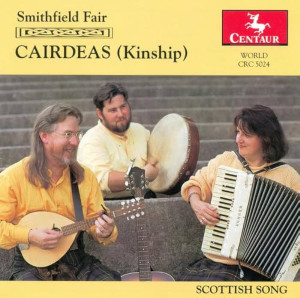 The very first thing I did upon receipt of Smithfield Fair‘s newest effort — aside from popping the disc in my player, of course — was pull out the liner notes and check how many tracks were original compositions. On the band’s previous effort Highland Call Dudley-Brian Smith’s songwriting was easily the high point of that album. Not everyone can write Celtic-inspired music and capture that unique historical resonance, so I’ve always felt those that can do so, should be harassed, badgered and encouraged to do more. To my delight, I counted nine of the 17 tracks to be new compositions.
The very first thing I did upon receipt of Smithfield Fair‘s newest effort — aside from popping the disc in my player, of course — was pull out the liner notes and check how many tracks were original compositions. On the band’s previous effort Highland Call Dudley-Brian Smith’s songwriting was easily the high point of that album. Not everyone can write Celtic-inspired music and capture that unique historical resonance, so I’ve always felt those that can do so, should be harassed, badgered and encouraged to do more. To my delight, I counted nine of the 17 tracks to be new compositions.
Then something odd happened. Checking the notes on “Glen Logie,” the opening track that’d had my head happily bobbing along for the previous four minutes, I was startled to discover that it was a traditional selection. A traditional. One that they’d managed to infuse with the energy and immediacy of their self-crafted works, something missing from the traditional tunes of Highland Call. The next track, “An Ataireachd Ard (The Eternal Surge of the Sea)” was a slower tune, more flowing and weepy, but there was still fire beneath the music. The vocal harmonies are sweet on chorus, complementing Jan Smith’s singing during the verses, and the mandolin interplay with guitar is, well, flawless in arrangement. And then the third track floored me. Kicking things up a notch again, Smithfield Fair scored a bull’s eye with “‘S Ann An Ile (Song of Isla).” The bouncy, lilting melody is exuberant and smile-inducing. Guest vocalist Margaret Claire Smith tackles the Gaelic lyrics with an unabashed enthusiasm, and the little girl quality of her voice reminded me instantly of Frances Cunningham’s voice work on “My Father’s Ship” from SixMileBridge’s debut album Across the Water.
Three in a row isn’t a fluke, it’s a trend. Without even listening to the rest of the disc, I knew that the band had found their muse. They’d hit their stride. Heck, maybe the stars were in the right alignment. Any way you slice it, they’d produced an album that surpassed their previous release in almost every way — and there’s no way I’d characterize Highland Call as gum stuck to your shoe. The sound quality here is as crisp as you can get, and the production values are top-notch. Arrangements and vocals are spot-on, and perhaps most importantly, the song selection is much stronger this go-around, with almost every piece playing to the trio’s strengths. Sure, I could’ve done without the threadbare chestnut “May the Road Rise to Meet You,” better known the world over as “An Irish Blessing” or some such. But, as far a problems go, that one’s pretty nit-picky.
But what of the new stuff, the original stuff? Well, on “Catriona,” Dudley-Brian Smith pens a piece that sounds for all the world like a 200-year-old traditional piece. With lyrics that run along the lines of “Thy face is the morning — the bright sun a-blow/My blessing — thy presence beside as I go/Thy hand I hae ta’en, Hoo-ri, Hoo-o!” this song is a direct descendent of freewheeling classics such as “Rothsay-O.” “Nutmeg’s Wellys,” a contribution from Jan, is a free-flowing accordion piece which wants nothing more than to have a jolly time. It succeeds.
A particularly pretty piece is “West Highland Waltz/Swept Away,” a collaboration between Dudley-Brian and Jan Smith. It’s gentle and moving, with an unassuming mix of guitar, accordion and bodhran. Dudley-Brian works his way unhurried through the lyrics: “So gentle and free/So graceful is she/as we float to the West Highland Waltz.” This is one that doesn’t have that historical quality to it. It doesn’t echo ages of history through every line, but that’s okay. It doesn’t need to. It’s content with what it is, unpretentious, and fits in quite nicely.
A change of pace is Dudley-Brian’s “Fire in the Glen.” Musically related to “Giant’s Dance” from Highland Call, this one’s much more driving and aggressive, and for all the Scots references and brogue thrown in, I can’t help but feel this piece has more of a Mediterranean air about it. Perhaps it’s a Greek feel, or maybe Balkan — I’m not entirely sure, but it certainly evokes more than just the Scottish Highlands. The lyrics are a bit weaker here than on the other originals: “We’ll stand side by side/A gathering of families/And stand before the ancient stone/All families know there’s a fire in the glen.” They aren’t trite, and not hackneyed, but there’s an artificial, forced quality about them. For all the lip service, the words lack the passion of the music behind them. Perhaps this would’ve been a good candidate for an all-Gaelic set of lyrics, a trick Dudley-Brian uses to strong effect on “Appainn, Mo Chridhe.” In any event, “Fire in the Glen” is the standout rocker in this set, and its faults are easy to forgive. That’s also pretty much the case with this album in its entirety. It’s fun. It’s friendly. It’s good — far better than I expected, and that’s no slight against Smithfield Fair.
(Centaur Records, 2000)
